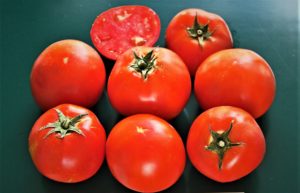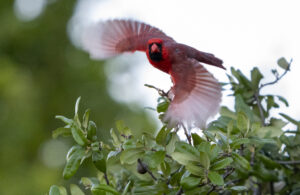- Three Ways To Protect Migratory Birds This Fall
- Goodwill and the RGV Vipers Team Up for a Skills Camp
- Santa Rosa ISD Offers Law Enforcement Cadet Program
- La Feria Lions vs. Raymondville September 13, 2024
- LFECHS Media Students Showcase their Work at Local Film Festival
- La Feria Hosts 4th Annual Trooper Moises Sanchez Obstacle Run
- Local Piñata Festival Promises to Bring Fun for the Whole Family
- USACE Awards Contract for BIH Channel Deepening
- Valley Native Bringing Advanced Oncology Services To UT Health RGV Cancer and Surgery Center
- Ten Important Ways to Help Keep Student Athletes Safe When the Heat Is On
Valley Cat Tomatoes Named Newest Texas Superstar
- Updated: April 16, 2022

Written by Adam Russell
Gardeners now have another tomato option that provides characteristics worthy of being named a Texas Superstar plant.
Valley Cat tomatoes have been named a Texas Superstar for its resistance to nematodes and other diseases in addition to its heat tolerance and consistent season-long productivity of good, round, red fruit, said Texas A&M AgriLife Extension Service horticulturist, Larry Stein, Ph.D., Uvalde.
“It is a consistent performer,” Stein said. “Valley Cat doesn’t do well one year and then not so well the next year, and we like consistency around the state when it comes to Texas Superstar plants. So, this adds another edible option for our gardeners.”
To be designated a Texas Superstar, a plant must perform well for growers throughout the state. Texas Superstars must also be easy to propagate, ensuring the plants are widely available and reasonably priced.
Get to know Valley Cat tomatoes
Valley Cat tomatoes are a medium-sized determinate plant that produces tomatoes with outstanding fruit quality, Stein said. It is an early to medium maturity variety that ripens to an attractive red color with excellent and consistent interior qualities as well as an outer firmness.
Tomatoes do continue to ripen after being picked and are typically harvested when they start to break, or change color, Stein said.
“It’s most ideal to pick these tomatoes when they break because they will be as good in flavor as if they were left to ripen on the plant,” he said. “Removing them from the plant and allowing them to ripen on the kitchen counter reduces the chances of birds, insects or other critters attacking the fruit.”
Valley Cat tomatoes are perennial plants but are grown as an annual in Texas due to cold weather. They are determinant plants but can easily reach 4-5 feet tall and need caging or staking for support, Stein said.
These vigorous plants typically produce 20 or more very plump, robust tomatoes and produce fruit throughout the growing season. Mature fruits weigh approximately 8 ounces and are typically about 4 inches across.
Plants have resistance to three nematodes, including root knot. In addition, they are resistant to fusarium wilt, grey leaf spot and verticillium wilt, Stein said. Pest and disease resistance and tolerances provide gardeners with more options to grow tomatoes without worrying about certain plant-related problems.
“Nematodes are becoming more abundant and becoming more of an issue for gardeners,” he said. “We think gardeners are buying plants and introducing them to their gardens and that they are increasingly showing up. So, resistant and tolerant plants are a big positive for gardeners.”
Planting and care
Valley Cat tomatoes can be planted in any soil that drains well. Full sun exposure is required for optimum fruit production, Stein said. Home gardening and commercial yields have been quite good across Texas due to the plant’s heat tolerance.
Stein said it is best to plant Valley Cat tomatoes in spring. They can be planted in mid-summer for fall harvest, though white flies and viruses can hinder production.
Starter plants perform best when they are placed in larger containers to create a good root ball, Stein said.
“We recommend taking 2-inch transplants and stepping them up to a gallon container to create a good root system,” he said. “It gets them off to a better start.”
Stein also suggests incorporating a 3-1-2 ratio fertilizer – three parts nitrogen, one part phosphorous and two parts potassium – into the soil at planting. Gardeners should then side-dress, or place fertilizer around the root system when plants show golf ball-sized fruit, though he warned against adding too much nitrogen as it can burn plants. Slow-release nitrogen can work as well.
“Valley Cat joins Celebrity as a Texas Superstar tomato,” he said. “Ornamental plants have gotten much of the focus in the past but given the rise in gardens and gardening across Texas, we felt it was important to highlight plants for food production and let people know they have some really good options out there.”
Texas Superstar is a registered trademark owned by AgriLife Research, a state agency that is part of the Texas A&M University System. Plants are designated by the Texas Superstar executive board, which is made up of nine horticulturalists from AgriLife Research, AgriLife Extension and Texas Tech University.




